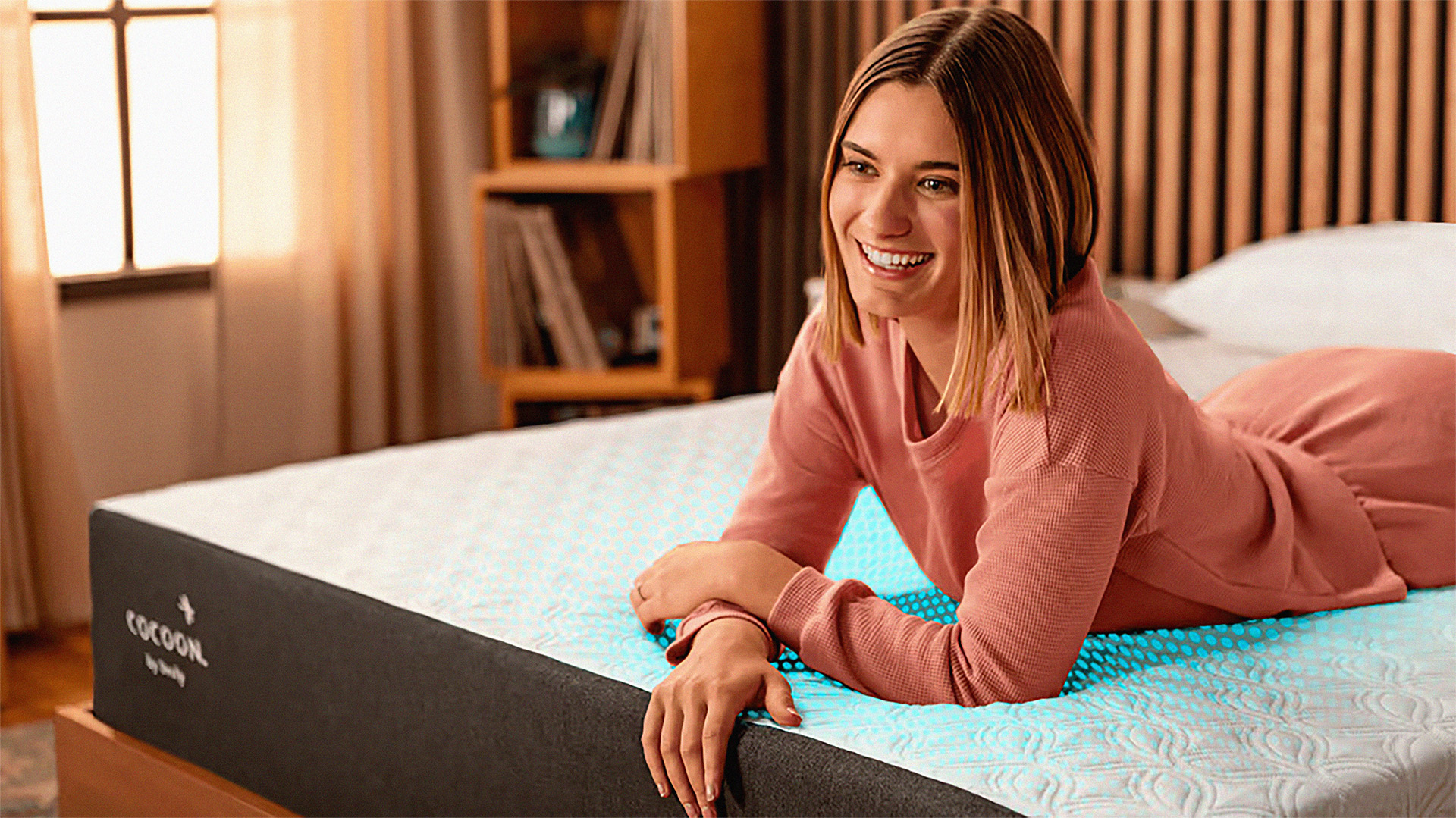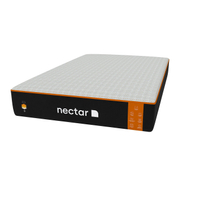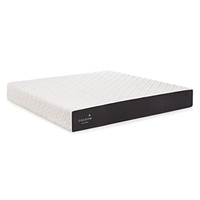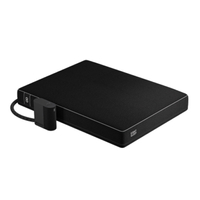3 signs you need a cooling mattress, no matter what time of year it is
Experts share the tell-tale signs that it's time to upgrade to a cooling mattress

What are the signs you need a cooling mattress? If you wake up feeling like a sopping-wet zombie stumbling out of a pool most mornings, it's likely time to dive into the soothing surface of a cooling mattress. Granted, your evening routines, sleep environment, and health status can trigger night sweats and hot flashes, but resting on a mattress packed with specialty cooling materials can help prevent those rude awakenings in the first place.
Wondering what medical experts may recommend for hot sleepers? We spoke to a couple of them – Grant Radermacher, Doctor of Chiropractic and owner of Ascent Chiropractic in Brookfield, WI, and Peter Polos, MD and sleep medicine specialist. They each shared the tell-tale signs that it's time to upgrade to a cooling mattress, along with tips on how to find the best mattress for your needs. (Still, you'll want to talk to your primary care physician for more personalized advice.)
If you're resolute in your decision to buy a cooling mattress but just want to know which one to get, we've rounded up three of our favorites below – all of them discounted during current mattress sales. Otherwise, if you're curious to know the signs you need a cooling mattress, keep reading...
What is a cooling mattress?
A cooling mattress is designed to regulate your body temperature so you don't overheat at night. It may have a layer or two of infused or open-cell foam, individually-wrapped coils to aid in air circulation, and/or breathable fibers woven into the top cover. There are also high-tech models that'll allow you to actively control the temperature of your mattress through a remote control or smartphone app.
3 signs you need a cooling mattress
1. Frequent overheating disrupts your sleep
"The most common sign that you may need a cooling bed is difficulty falling asleep or maintaining sleep," says Dr. Polos. "Our body temperature also fluctuates while we sleep, but if you find yourself consistently waking up sweating, you might want to consider a cooling bed."
When it's time for bed, your body naturally starts to cool down. "A major trigger to promoting sleep onset is a drop in core temperature of approximately 1-1.5 degrees Fahrenheit from baseline," says Dr. Polos. "This drop is tightly tied to our internal circadian rhythm. However, it is also influenced by external factors such as the ambient room temperature and the micro-environment around our body under bedcovers."

Dr. Polos continues, "While night sweats can be due to health or age-related factors, they can also be a result of a less-than-ideal sleep environment, which includes temperature." In any case, higher internal or external temperatures will delay your body's wind-down process and hinder your ability to stay asleep.
Worse yet, a continuous lack of quality sleep will negatively impact your overall well-being. "While one night of restless sleep may not be a big deal, chronic sleep deficiency can lead to serious health problems," says Dr. Radermacher.
Get daily insight, inspiration and deals in your inbox
Sign up for breaking news, reviews, opinion, top tech deals, and more.
The National Heart, Lung, and Blood Institute says sleep deprivation can mess with your mental health, wreck your concentration and decision-making skills, and weaken your immunity against illnesses. A lack of quality sleep will also raise your chances of a stroke and put you more at risk for developing heart disease, high blood pressure, and diabetes. In short: a cooling mattress can benefit your sleep and your overall health.
2. You and your partner fight over the thermostat
Whether you share a bed with someone who likes the room a lot hotter (or colder) than you do, or snuggling with your partner feels like hugging a space heater on full blast, don’t start thinking about sleeping in separate rooms just yet. A cooling mattress could be what you need to sleep soundly side by side.
(That said, science rules in favor of those who prefer to keep the thermostat on a lower register: "Elevated room temperature can reduce the release of body heat, resulting in the disruption of sleep during the night," says Dr. Polos.)
If it's within your budget, buy a smart mattress with dual-zone temperature controls so each person can make their side as warm or cool as they want. Also consider a split king, which is two twin XL beds on separate bases pushed together to make one large bed that each person can tailor to their needs.
Of course, a cooling mattress with a standard setup can still do wonders for couples, especially if it's exceptional at limiting movement. That way, if one of you shifts positions or gets up out of bed first, the other person can keep snoozing uninterrupted. Memory foam mattresses excel at motion isolation so seek an all-foam bed packed with specialty cooling materials.
3. Your sheets and PJs are often soaked in sweat
Mild sweating at night is common, but if your pajamas and covers are drenched by the time you wake up, it might be a sign of a bigger issue, especially if it happens a lot. If you haven't already, speak with your doctor to help identify the root cause of your night sweats so you can treat them properly.

According to Dr. Polos, health conditions that can cause sleepers to overheat include menopausal hot flashes, thyroid disorders (which can delay the drop in core body temperature), and obstructive sleep apnea (which can affect hormones.) He also says medications can trigger hot sleep – for instance antihypertensives, some psychotropic medications, and select antibiotics.
Fortunately, a cooling mattress can go a long way in preventing health-related night sweats from disrupting your sleep. Dr. Radermacher highlights some promising news: "Research out of the journal Menopause found that sleeping on a cooling mattress can reduce the frequency and severity of these sleep disturbances by over 52%." If you can't afford a full-fledged mattress, a cooling mattress topper (similar to what was used in the study) should work just as well.
What to look for in a cooling mattress
Cooling mattresses come in a range of options – from budget foam models to smart beds with advanced temperature-regulating technology. Here's what you should look for to ensure a more refreshing night's sleep:
- Foam Density: Dr. Radermacher says, "The density of the foam used to construct a mattress should be the top concern for anyone in the market for a new cooling mattress – the denser the foam, the more support it provides for your body." He suggests choosing a mattress with foam that has a density of at least 3 pounds per cubic foot (PCF).
- Cooling Materials: Dr. Radermacher recommends looking for materials "designed to disperse heat more efficiently and provide a cooler sleep surface." Some options to consider are memory foam infused with gel or copper, open-cell foam that's perforated for enhanced ventilation, or latex, which is a naturally breathable material. Hybrid mattresses (with foam and springs) and innerspring mattresses are also good for hot sleepers because coils allow for better airflow. Smart mattresses allow for dual-sided temperature control, but they're very expensive.
- Trial Period: "What works best really comes down to personal preference," says Dr. Radermacher. That’s why it’s a good idea to pick a mattress that comes with a trial period, giving you a chance to test it out before making a final decision. The average mattress trial is 100 nights, although some brands offer up to a full year so you can see how a mattress performs across all seasons.
Is a cooling mattress good for back pain?
If you have a back injury, a cooling mattress could aid in your recovery. "[Non-cooling] mattresses often trap body heat, which can interrupt deep sleep. This kind of disrupted sleep can make it harder for your body to heal, especially from a back injury," explains Dr. Radermacher. There's also the risk of torquing your back and exacerbating your injury if you frequently toss at night in an attempt to get comfortable.

Additionally, back problems like sprains, strains, herniated discs, and arthritis may be accompanied by swelling and inflammation. Dr. Radermacher says, "Heat retention from a non-cooling mattress won't do these conditions any favors and can absolutely make the associated inflammation and pain worse."
So, if you're on the hunt for a mattress for back pain, it’s worth considering one that’s also good at keeping you cool.
Are cooling mattresses just for hot sleepers?
"If you’re not prone to night sweats, sleeping on a cooling bed is an individual call," says Dr. Polos. This is important to consider since cooling upgrades can be pricey – and you don't want to pay for features you (and your sleep partner) don't need. "If you have a proper sleep environment and are not having temperature-related sleep disturbances, then perhaps you will not get the added benefit from such a bed," adds Dr. Polos.
With that in mind, Dr. Polos says there aren't any known downsides or risks to sleeping on a cooling bed, so even if you don't have a chronic overheating problem you can still sleep on such a mattress if you otherwise find it comfortable for your sleep style and body type.
3 cooling mattresses to check out right now
Nectar Premier Copper Mattress: was $1,499, now from $999 at Nectar
Best cooling mattress for most people: This is Nectar's top-of-the-line mattress, although thanks to regular Nectar mattress sales you'll never have to pay full price for it. (A queen is available for $1,299 after markdown.) The all-foam Nectar Premier Copper boasts a 4-inch layer of pressure-relieving gel memory foam plus a dual-action cooling cover woven with copper and polyethylene fibers that responds to changes in your body temperature. Good news for couples – motion isolation here is excellent. Try it out at home risk-free for a full year.
Read more: Should I buy the Nectar Premier Copper?
Cocoon by Sealy Chill Mattress: was $619, now from $399 at Cocoon by Sealy
Best affordable cooling mattress: If you're on a tighter budget, the Cocoon Chill is a fantastic option. This all-foam bed-in-a-box costs just $699 for a queen thanks to an evergreen Cocoon by Sealy Chill mattress sale. It also comes with free pillows and sheets, as well as a 100-night trial. The Cocoon Chill features a 4-layer design plus a stretch-knit cover woven with Phase Change Materials (PCM) to draw away body heat. For an additional $99, upgrade to the Extra-Chill Foam model, which boasts phase-changing comfort foam and an upgraded cooling cover. For more bounce and an even cooler sleeping experience, check out the Cocoon by Sealy Chill Hybrid mattress starting at $539.
Read more: Cocoon by Sealy Chill mattress review
Eight Sleep Pod 3: was $3,095, now from $2,895 at Eight Sleep
Best premium cooling mattress: The Pod 3 has five foam layers that'll effortlessly contour your body – whether you sleep on your front, back, or side. What sets this mattress apart, though, is its smart features. The Pod 3 uses artificial intelligence to regulate the temperature on either side of the bed according to your and your partner’s sleep schedules and preferences. (You can manually tweak these settings via smartphone, too.) Yes, this is an expensive mattress, and you'll need a subscription to access all of the smart features (from $15 per month). If that's a bit rich for you, the Eight Sleep Pod 3 Cover is a more affordable alternative, but even that costs at least $2,000.
Read more: Eight Sleep Pod 3 Cover review
If the above options don't meet all of your must-haves, you can browse this month's mattress sales to find a bed that's perfect for you – or take a look at today's best deals for cooling mattresses below:
Other ways to sleep cooler at night
Choosing the right cooling mattress will immediately yield quality restorative sleep, but there are additional steps you can take to combat overheating:
- Mind your diet: "Caffeine and alcohol can contribute to increased body temperature and sweating," says Dr. Radermacher. "Avoiding them, especially in the hours leading up to bedtime, can help your body regulate its temperature better." So trade the dessert latte or nightcap for foods that'll help you sleep well.
- Chill out (mentally): A cool head can help you sleep cooler. "Stress and anxiety rev up your brain and body, resulting in overheating, so deep breathing exercises or meditation before bed can help calm the mind and promote better (and cooler) sleep," explains Dr. Radermacher. To aid in relaxation, use a meditation app.
- Optimize your sleep space: Besides your mattress, other essentials like your sheets and pillows can promote a comfier sleep environment. Also, your room temperature should be "ideally 67-69 degrees Fahrenheit," says Dr. Polos. "[That] creates a temperature gradient that allows heat to leave the body."
"Achieving quality sleep on a nightly basis should be everyone’s goal," says Dr. Polos. "Do not hesitate to seek medical consultation for persistent chronic sleep issues...a combined approach between you and your health care provider can go a long way towards achieving a good night’s sleep."

As a chiropractor at Ascent Chiropractic in Brookfield, WI, Dr. Grant Radermacher specializes in the treatment of joint and soft tissue pain with innovative, science-based, non-surgical approaches to functional medicine.

Peter Polos, MD, is an Assistant Professor of Sleep Medicine at Hackensack JFK University Medical Center, as well as a sleep medicine specialist with Sleep Number. He's board certified in pulmonary and sleep medicine with a PhD in microbiology and immunology.
Alison is a freelance writer and editor from Philadelphia, USA. She is an expert mattress tester and sleep product reviewer, and has been sharing trusted buying advice and retail news for over a decade. When she isn't reviewing mattresses or hunting for deals, Alison can be found teaching/training in martial arts, fawning over skincare, and indulging in her quarantine-borne hobby: cooking.



